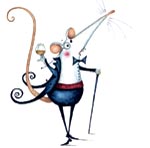Town mouse: reflecting on war
Clive plans his talk for ABF the Soldier’s Charity in September, and reflects on the nature of war


I’m excited about September 7. I’ll be in Exeter to talk about War Memorial for ABF, the Soldiers’ Charity. Not only is this an excellent charity (tickets £25), but I hope to revisit Lydford, where the war memorial that I wrote about is located. Naturally, I was there a lot when the book was in preparation, but despite putting out as many feelers as I could, I clearly didn’t reach everybody. A previously untraced descendant of one of my men, as I think of them, will be at the talk. Another name on the roll of honour will emerge more clearly from the shadows.
As the centenary of the First World War progresses—and it has four years to run—a conflict that once seemed catastrophic but remote will, to many, come to feel closer. There’s every reason that it should. We still have to learn the lesson that wars are easier to start than to stop— look at Iraq. They’re such a dislocation to human affairs that few can foresee their consequences. Which of the Powers would have gone into the First World War if it had known its empire was doomed as a result? Mankind can be terribly stupid. I say ‘mankind’ advisedly. Women might have done better.
* This article was first published in Country Life magazine on August 13 2014
* Follow Country Life magazine on Twitter
Sign up for the Country Life Newsletter
Exquisite houses, the beauty of Nature, and how to get the most from your life, straight to your inbox.
-
 Burberry, Jess Wheeler and The Courtauld: London Craft Week 2025 explained
Burberry, Jess Wheeler and The Courtauld: London Craft Week 2025 explainedWith more than 400 exhibits and events dotted around the capital, and everything from dollshouse's to tutu making, there is something for everyone at the festival, which runs from May 12-18.
By Lotte Brundle
-
 Everything you need to know about private jet travel and 10 rules to fly by
Everything you need to know about private jet travel and 10 rules to fly byDespite the monetary and environmental cost, the UK can now claim to be the private jet capital of Europe.
By Simon Mills